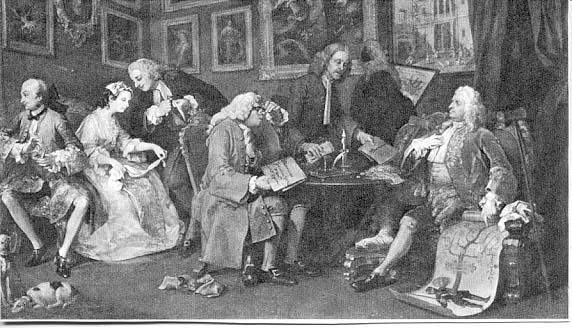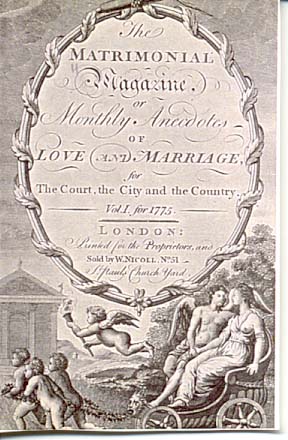Through the ages, it has been an acknowledged fact that
marriages were often arranged between families, especially when the
preservation of land and property was at stake. In other words,
marriageable daughters almost always came with dowries of land, property
and money.
There is confirmation by Robert (Bruce) King of Scots
of the Charter of William Fraser to Roger son of Fynlaw of Twedyn dated at
Glasgow, 12th June, 19th year of reign (1325).
Witnesses: Bernard Fraser, Abbot of Arbroath, Chancellor; Walter, Steward
of Scotland; James, Lord Douglas; Alexander Fraser, Chamberlain of
Scotland, Knights. Thus, the Barony of Drumelzier was granted to Roger by
Sir William Fraser, whose daughter became the ancestress of the Tweedies
of Drumelzier for "a pair of guilt spurs or 12 pennies if asked".
Sometimes, these contracts or indentures went a bit
further, as in the contract matrimoniall betwixt Hugh Rose 4th
of Kilravock and Joneta de Chesholme, daughter of Sir Robert Chesholme,
Constable of the Castle of Urquhart, who was also Chesholme of that Ilk.
On Thursday, the 2nd of January, in the year
of grace 1364, after mention of the land and money…. It is also fully
agreed that if the said Hugh and Janet shall live beyond a complete year
after marriage, the said Hugh shall brook the said land for his lifetime,
but in case the said Hugh shall decease (which God forbid) without heirs
of his body begotten between him and the said Janet, and in that case, the
said lands shall return into the hands of the said Sir Robert and his
heirs, after the decease of the said Hugh. The lady’s father also
agrees to keep and entertain his daughter from the date of her marriage
"for three years in meat and drink" while her husband is only to "find and
keep her in all needful garments and ornaments" during the same period.
Janet brought with her extensive lands at Strathnairn.
Unfortunately, her son, Hugh Rose 5th of Kilravock, lost all
the family’s writs and charters when Elgin Cathedral, where they had been
placed for safe keeping, was burned by the Wolf of Badenoch. His son John
was forced to reconstruct the family’s titles to their landholdings, and
obtained charters from James I, the Earl of Ross and the Chisholm.
In 1635 the Inverness Presbytery recorded the marriage
of Mary Fraser, oldest daughter of Hugh Fraser 7th Lord Lovat
(1591-1645) by his wife Isobel Wemyss (1598-1636), to David Ross 12th
of Balnagowan, an event involving a sharp exercise of ecclesiastical
discipline by the Bishop of the Diocese. It was found that Mr. John
Houston (d. 1659), minister of Wardlaw, had married the couple upon two
proclamations, instead of three, as was required by the rules of the
church, whereupon Mr. Houston was summarily suspended by the Bishop. My
Lord Bishop, in administering so severe a censure for a minor fault,
stated that he acted with the knowledge that critical eyes were looking
on, and it was better he should censure the minister than that he himself
should be censured by the Presbyterians, "now a very prevaileing (sic)
party in the Kingdom." It may be of interest to note the sequel as it
affected the minister of Wardlaw. Mr. William Fraser (d. 1665), minister
at Kiltarlity, was appointed to intimate the Bishop’s sentence at Wardlaw,
but when he arrived at the Church there was no beadle, no bell-ringing,
nor was book or sandglass to be found. Mr. Houston was not at first
disposed to acknowledge any fault in the matter, but eventually confessed
and craved pardon. The Presbytery rebuked the delinquent, but was
satisfied if the Bishop and Synod were complaisant. It may also have
helped Mr. Houston’s case that his wife was a sister of Mr. William
Fraser, minister of Killearnan (d. 1659) and that another brother-in-law,
Thomas Fraser, of Phopachy, was married to a daughter of Rev. William
Fraser (d. 1665), minister at Kiltarlity.
The Rosses were royalists in the civil war, and David
Ross, the twelfth chief, led almost a thousand of his clansmen against the
forces of Oliver Cromwell at the Battle of Worcester in 1651. The
royalists were defeated, and Ross and many of his men were taken prisoner.
The chief was imprisoned in the Tower of London in 1653, while many of his
clansmen were transported to the colonies in New England. His son, David,
succeeded to the chiefship when he was only nine years of age.
Captain Simon Frazer of Bewfort (sic) used a
different approach. Robert Munro, minister of Abertarff had married him in
an extraordinary manner in 1697, to Lady Amelia Murray "while the Lady was
under restraint by an armed force." Lady Amelia Murray (1666-1743) was the
widow of Hugh Fraser 9th Lord Lovat (1666-1696) whose young
daughter Amelia Fraser (1686-1763) had previously been saved from Simon’s
clutches. Major James Fraser of Castle Leathers (1670-1760) was present
and described the event in Major Fraser’s Manuscript: "The Lady not
yielding willingly, there was some harsh measures taken, a parson sent
for, and the bagpipe blown up. The ceremony being used by the parson….a
double guard being kept in the house, and thereabouts, for the space of
eight days. Thereafter (to my certain knowledge) whatever new light the
Lady had got, desired her husband to send for Mr. William Fraser (d.
1710), minister of Kilmorach, in order to make a second marriage (not
thinking the first valid) before a select number of gentlemen; which was
accordingly done." Simon was then 29, the recently widowed Lady Lovat
about 31 and the mother of four young daughters. The lady was subsequently
sent back to her family, the Murrays, and Simon Fraser escaped to exile in
France.

Hogarth’s "Marriage Contract" betroths a reluctant lass with large
dowry to vacuous young gentleman with family tree but no money
In his Antiquarian Notes [1897] Charles
Fraser-Mackintosh comments on the great sensation caused towards the end
of January 1744, by the abduction of Miss Jean Fraser, only daughter of
the deceased Baillie William Fraser of Inverness and of Mrs. Jean Kinnaird,
by William Fraser, then a merchant in Fort-Augustus and later a vintner in
Inverness, and a member of one of the most respectable families in
Stratherrick. It would appear that Lord Lovat [a.k.a. Captain Simon Fraser
of Beaufort] was applied to by William Fraser and his friends, but his
Lordship absolutely declined, and the postscript from his letter, dated 25th
January 1744, to Hugh Fraser, younger of Foyers, shows his views of
abduction in old age, different probably from what he would have written
fifty years earlier. "As to the letter which it seems the
 girl
has wrote to Inverness, in order to ‘appease the Magistrates’, I can
assure you neither that nor all the declarations that she can make, while
her liberty is restrained will avail or better the case a single farthing.
These proceedings can have no other effect but to aggravate the crime and
to inflame the resentment to it and nothing but sending the girl
immediately to Inverness, whether married or unmarried, can save every man
that has been in this affair from ruin and destruction, the whole name of
Fraser from eternal shame, and my person and family from hurt and
trouble."
girl
has wrote to Inverness, in order to ‘appease the Magistrates’, I can
assure you neither that nor all the declarations that she can make, while
her liberty is restrained will avail or better the case a single farthing.
These proceedings can have no other effect but to aggravate the crime and
to inflame the resentment to it and nothing but sending the girl
immediately to Inverness, whether married or unmarried, can save every man
that has been in this affair from ruin and destruction, the whole name of
Fraser from eternal shame, and my person and family from hurt and
trouble."
By the 1800s young ladies were free to choose their
husbands, an increasingly larger number had something to say about their
suitors, and they were determined to be sought. Many men were sadly
unprepared for their new roles as winners of hearts, rather than
bargainers for wives. So, the nineteenth century was ushered in with
how-to-woo-and-win books. Victorian ladies were determined to pick and
choose.
In the century of science and progress, it was
inevitable that science should eventually discover love.

